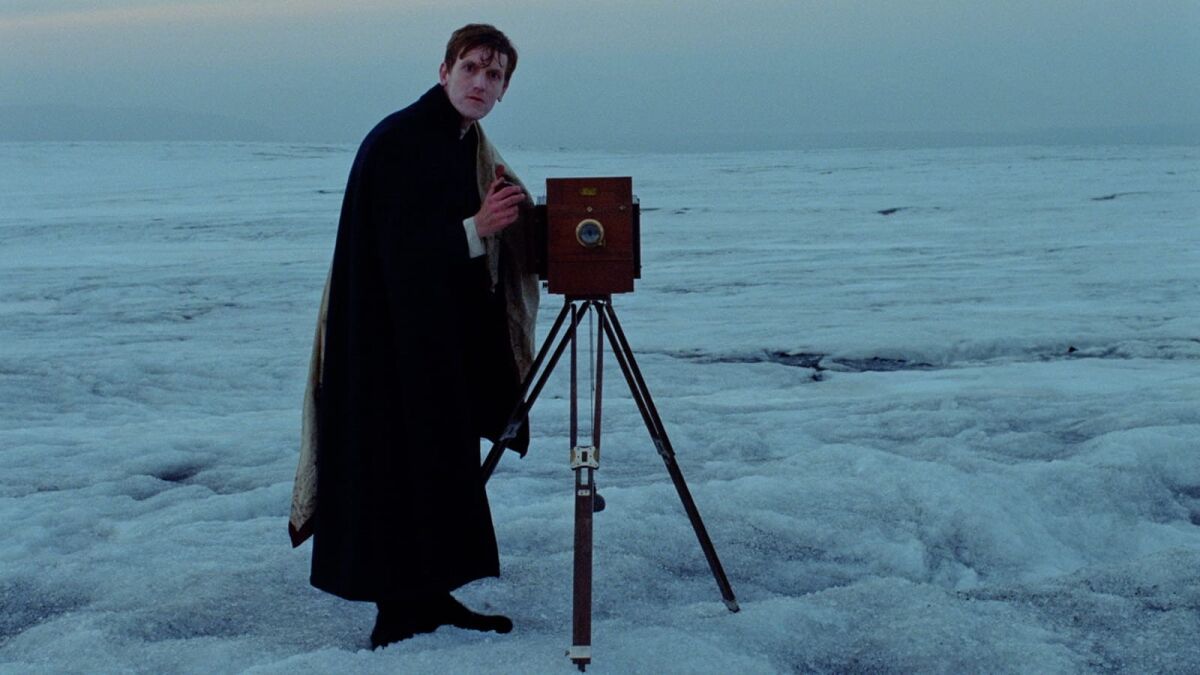Hello! I’m Mark Olsen. Welcome to another edition of your regular field guide to a world of Only Good Movies.
Newsletter
Only good movies
Get the Indie Focus newsletter, Mark Olsen’s weekly guide to the world of cinema.
You may occasionally receive promotional content from the Los Angeles Times.
With Valentine’s Day right around the corner, it makes sense that local theaters will be leaning into the holiday. Feeling lonely? The movies have you covered. Feeling partnered up and madly in love? The movies have you covered for that too. Dissatisfied in your relationship? There’s even a movie for that. As they say, “heartbreak feels good in a place like this,” so we’re just going to look past this week’s AMC pricing kerfuffle for the moment.
‘Tenderness’ at the Academy. Curated by Maya Cade, creator of the Black Film Archive, the Academy Museum is launching a series called “Try a Little Tenderness” that uses the structuring concept of onscreen moments of affection to move through Black cinema history, revealing deep emotional truths along the way.
There are some real rarities among the selections, and any night of the program, running through Feb. 25, is just a genuine treat. Also, with Sidney Poitier and Diahann Carroll in “Paris Blues” or Eartha Kitt and Sammy Davis Jr. in “Anna Lucasta,” there are true stars in full glory.
Filmmaker Charles Burnett is scheduled to appear with his 1969 student film “Several Friends” on a double bill with Michael Roemer’s 1964 “Nothing but a Man.” Critic and programmer Miriam Bale will join Cade for a conversation along with the double bill of Les Blank’s 1971 “A Well Spent Life” and Shirley Clarke’s 1968 “Portrait of Jason.”
Romance and friendship at the Cinematheque. In conjunction with Outfest, the American Cinematheque will have a Valentine’s Day screening in 35 millimeter of Alice Wu’s 2004 queer Asian American rom-com “Saving Face” with actors Lynn Chen and Michelle Krusiec.
The Cinematheque is also running a series, “Happy Galentine’s Day!,” of films with female ensembles through Feb. 14. Titles include “9 to 5,” “Mean Girls,” “A League of Their Own,” “D.E.B.S.,” “Girls Trip” and “Some Like It Hot.”
Enjoying this newsletter? Consider subscribing to the Los Angeles Times
Your support helps us deliver the news that matters most. Become a subscriber.
‘Magic Mike’s Last Dance’
Returning Steven Soderbergh to the director’s chair, “Magic Mike’s Last Dance” is the third and supposedly final film in the series about the strivings of male strippers in Florida. Except this time, the story finds Mike (Channing Tatum) whisked to London by a wealthy woman (Salma Hayek Pinault) who wants him to stage a show at a theater owned by her husband. (You can guess how the show turns out.) The movie is in theaters now.
For The Times, Justin Chang wrote, “it makes a certain sense that the boisterous male camaraderie that buoyed the first two movies should recede into the rearview mirror. ‘Magic Mike’s Last Dance’ looks anxiously and a bit sadly to the future, and also to the awkward, endlessly fraught state of heterosexual relations in the early 21st century — a condition that Tatum and Hayek Pinault explore through their own tricky dance of dependency and desire. … The movie walks a half-ponderous, half-intriguing tightrope: Can Mike’s talents as a male entertainer finally become both a legitimate source of professional satisfaction and an expression of ardent, unfeigned desire? That may be the most far-fetched of fantasies — but maybe, this movie imperfectly but touchingly suggests, those are the only ones worth chasing.”
For Vulture, Alison Willmore wrote, “Once you turn a character into a lens for female desire, it’s hard to go back. Soderbergh has reclaimed the director’s chair for ‘Magic Mike’s Last Dance,’ and the movie he made hovers awkwardly between the modes of its predecessors, unsure how to treat its loose-hipped hero. Mike’s done with stripping when the film begins. He’s also done with his dream of being a furniture designer, having lost his company in the pandemic, and now he’s broke and drifting at the age of 40. … Despite being half–‘Let’s put on a show’ movie and half–romantic comedy, two genres dedicated to delight, ‘Magic Mike’s Last Dance’ never achieves satisfaction.”
For Rolling Stone, K. Austin Collins wrote, “‘Magic Mike’s Last Dance’ sticks to one place, but that isn’t why, in contrast to the best moments from the previous movies, it feels like it’s going nowhere. Tatum’s usual charm is at its limpest here — that can’t help. It’s strange. The premise of the dancing this time around is permission. Consent. No more throwing ladies around onstage as if they automatically agreed to it by virtue of being there. No more hip-breaking pyrotechnics to put Elvis to shame. Consent, in this new world, is foreplay. That’s admirable and, for many people, hot. It needn’t have given way to a movie that felt so tame. But tame is what ‘Magic Mike’s Last Dance’ is — what it apparently wants to be, what it becomes in exchange for its new, cardboard-simple, ostensible pro-woman worldview. The movie’s pleasures mute themselves beneath its good intentions. It wants to be about what women want. But it feels like it never asked.”
For the AP, Lindsey Bahr wrote, “Asking why sequels exist doesn’t usually produce satisfying answers, but ‘Magic Mike’s Last Dance’ is a film that was born backwards, a fit of inspiration from Steven Soderbergh after seeing what Tatum had done with Magic Mike Live. … This film is that thing that many sequels promise but don’t deliver on: It’s both a true evolution and a conclusion. It’s also part fantasy, part bleak reality, part commentary [on] the fundamental value of dance and what’s lost in a society that has forgotten how. It is not, in other words, simply another striptease.”
For Slate, Dana Stevens wrote, “To the disappointment of this once-enthusiastic ogler, ‘Magic Mike’s Last Dance’ fails to capture the eponymous magic of the first two very different but both delightful movies. Despite Tatum’s undimmed charm as the easygoing, erotically gifted Mike, and despite the welcome presence of Salma Hayek Pinault as his client-turned-lover-turned-employer, this third outing suffers from an odd energy deficiency, as if it had already blown its metaphorical load. Soderbergh and [screenwriter Reid] Carolin seem to have misunderstood the most basic appeal of their own franchise: We come to ‘Magic Mike’ movies to watch Channing Tatum and, if at all possible, his well-built buddies dance.”

Salma Hayek Pinault and Channing Tatum in “Magic Mike’s Last Dance.”
(Warner Bros. Pictures)
Enjoying this newsletter? Consider subscribing to the Los Angeles Times
Your support helps us deliver the news that matters most. Become a subscriber.
‘Godland’
Written and directed by Hlynur Pálmason, who was born in Iceland and lives and works in Denmark, “Godland” is about a 19th century Danish priest named Lucas (Elliott Crosset Hove) who is sent to Iceland. The movie is in theaters now.
For The Times, Justin Chang wrote, “Even more than ‘Silence,’ Shūsako Endō’s much-adapted novel about 17th century Portuguese missionaries in Japan, the movie is a withering chronicle of spiritual hubris. Unsurprisingly, it’s also a story about the willful blindness of colonialism, and one that benefits from Pálmason’s own dual-layered identity as an Icelandic-born filmmaker who spent many years studying and living in Denmark. From the opening scene of Lucas receiving his instructions from an older priest, there’s a clear, if understated, tension between the Danish ruling powers and what they assume to be their untamed island subjects, so desperate in their need for order, civilization and God.”
For the New York Times, Manohla Dargis wrote, “Built on visual and thematic contrasts, spirit and flesh included, the bulk of the story is roughly divided between Lucas’s journey to the coast and what happens after he arrives. The journey is the strongest, most revelatory section, and the land’s extremes — its beauties and perils, its mossy-green stretches and outcroppings of black lava, its depthless gorges and sweeping plains — set the tone and mood while revealing Lucas’s character facet by facet. Working with a boxy aspect ratio and making expressive use of long shots that can turn travelers into specks, Palmason underscores the grandeur of this place and the puniness of those traversing it.”
For IndieWire, Carlos Aguilar wrote, “The life and work of writer-director Hlynur Pálmason seems suspended in a liminal space between his homeland of Iceland and the neighboring Scandinavian nation of Denmark, where he studied filmmaking and has now raised a family. And nowhere is that interstitial status more evidently reflected than in his third and finest feature yet, ‘Godland,’ an arrestingly beautiful and philosophically imposing bilingual historical drama about the arrogance of mankind in the face of nature’s unforgiving prowess, the inherent failures of colonial enterprises, and how these factors configure the cultural identities of individuals.”

Elliott Crosset Hove in “Godland.”
(Janus Films)
‘Full Time’
Written and directed by Éric Gravel, “Full Time” follows a single mother (Laure Calamy) in Paris as she hustles between her job in a luxury hotel and taking care of her two children. When a transit strike throws her carefully constructed life into chaos, the simplest things become complicated adventures. The film is in theaters now.
For The Times, Robert Abele wrote, “‘Full Time’ is canny enough to understand that many people’s make-do existences are ready-made for compassionate thriller-ization. Gravel, in the heart-stopping vein of Belgium’s social-realism-minded Dardennes brothers, invests his protagonist’s one-challenge-at-a-time needs with the kind of visual intimacy and racing rhythm that makes us feel intensely close to Julie, from first sprint in her dehumanizing day to the exhaling bathtub soak she takes each night. … It’s Calamy’s show, though, and in Julie’s gantlet of duties and drags — running, cleaning, cajoling, collapsing, recharging — she brings as much no-nonsense physicality as Keanu Reeves would fending off an array of ‘John Wick’ assassins.”
For the New York Times, Beatrice Loayza wrote, “The film is a portrait of modern labor that moves with the breathless tension of a Safdie brothers’ joint. But instead of gangsters and cocaine, it finds a flurried momentum in one ordinary woman’s everyday obligations, which threaten to break her when a nationwide strike throws her tenuous act off balance. … Worked to the bone because of her inability to find decent employment and child care, because her supervisor only values her insofar as she obeys like a robot, Julie is a veritable Everywoman, in thrall to a system that demands productivity at every turn. Such a life makes one brittle, but there are no breaks.”

Laure Calamy in the movie “Full Time.”
(Music Box Films)
Stay connected with us on social media platform for instant update click here to join our Twitter, & Facebook
We are now on Telegram. Click here to join our channel (@TechiUpdate) and stay updated with the latest Technology headlines.
For all the latest Music News Click Here
